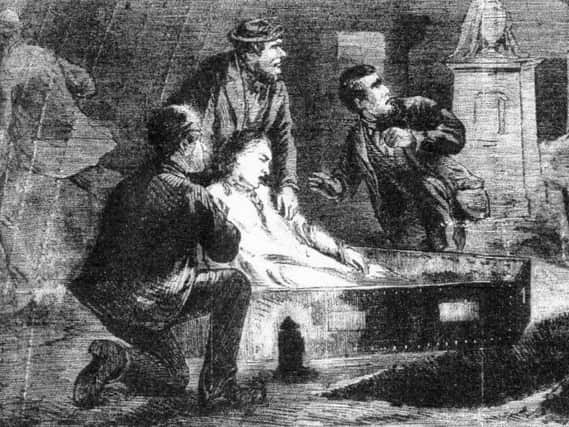Grave robbers jailed for taking bodies of old man and boy, 10


In early March 1832, among the inmates of Preston’s House of Correction were William Harwood, 24, and Richard Fitzgerald, 32.
They had been remanded in custody after appearing at Accrington Police Court accused of grave robbery.
Advertisement
Hide AdAdvertisement
Hide AdA few days earlier the freshly buried bodies of an old man and a young lad had been dug up from graves in the Accrington churchyard and stolen.
Their disappearance led to a widespread search and both bodies were found concealed in the hedgerows, wrapped in sacks, not far away.
There was great distress felt by their relatives and a watch kept on the locations where the bodies were found. Early next morning a gig was observed on the highway and two men with blackened faces were seen to arrive at the spot where the bodies were found, intent on carrying away the corpses to sell them for dissection.
A scuffle followed and, with local constable Joseph Booth in control, the men were overpowered and taken into custody. The despicable crime caused much outrage and the pair stood accused at the Preston Quarter Sessions of April 1832.
Advertisement
Hide AdAdvertisement
Hide AdAmongst the witnesses was James Piccup, a surgeon from Manchester, who testified that the men had approached him with the
intention of selling on the bodies for a guinea a piece for medical research.
James Jackson, sexton, told the hearing that he had discovered an open grave and the body of Henry Nuttall, an old man, missing.
A further search had led him to discover an empty coffin and the corpse of a recently buried 10-year-old missing. Other witnesses testified as to seeing the two accused in the vicinity of the church yard and of discovering the bodies.
Advertisement
Hide AdAdvertisement
Hide AdDr Brown represented the accused but called no witnesses and simply stated that the prisoners thought they were doing a public good delivering up bodies for dissection.
He remarked that it was impossible for medical men or surgeons to carry out their profession without the aid of dissection.
He pointed out that a couple of years earlier a resolution had been rescinded in Manchester that permitted the body of any deceased paupers be sent to the Manchester School of Anatomy if no relatives could be found.
The jury found the case against both of the prisoners proved and the Chairman Thomas Batty Addison expressed his disgust at an act that had caused so much distress to the relatives of the recently deceased victims.
Advertisement
Hide AdAdvertisement
Hide AdHe then informed them that they would be returning to the Preston Gaol for a further six calendar months where they could reflect on their abhorrent crime, that even the worst of criminals found disgusting.
